|
"Star Power"
by Paul Rhodes for West Side Story
(Photos: Paul Rhodes)
|
|
|
|
Click to enlarge:
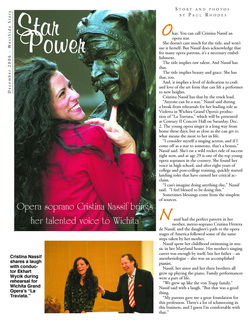 |
|
|
"Catch a rising star" Interview by Chris Shull - The Wichita Eagle
(Photo: Gallery Studios, courtesy of Opera Tampa)
|
|
|
|
What's it take to break into opera these days? Cristina Nassif, the 29-year-old star of Wichita Grand Opera's "La Traviata," tells all.
Cristina Nassif did what a lot of young people do after finishing college and four years of graduate school -- she moved back in with her parents.
Nassif, though, is no slacker. She's an opera singer, negotiating those difficult years between formal schooling and a secure career.
Her parents provide more than just room and board. Nassif's mom is a singer, too, and gives insight and encouragement gleaned from her own career. Her dad, retired from the Air Force, is a pianist; he helps her practice and accompanies her on auditions.
Nassif, 29, has not been idle. Her career is in launch mode.
On Saturday, Nassif will star as Violetta in Wichita Grand Opera's season-opening performance of "La Traviata" at Century II Concert Hall. It will be just her second essay of the role.
She first starred in "La Traviata" at Virginia Opera last year. That led to a pair of performances as Vitellia in Mozart's "La Clemenza di Tito" with Placido Domingo's Washington National Opera last spring.
She sang the title role in Bizet's "Carmen" in Tampa in 2005 and with Virginia Opera in October; she will return to the company in March as Nedda in "I Pagliacci."
Nassif said what she needs most to keep her career momentum going is exposure.
"I'm the type of performer who just needs to be heard," Nassif said. "I think I'm headed in the right direction. I hope my performances will speak for themselves. I think I'll get more work from word of mouth."
Nassif arrived in Wichita on Nov. 14 to prepare for "La Traviata." She took time before rehearsal last week to talk about the difficulties and the joys of being a young opera star on the rise.
How did you break into professional opera?
I think it is important to find a company or a director or a conductor who is willing to take a chance on an unknown.
Finishing grad school (at Academy of Vocal Arts in Philadelphia) was really difficult because you do all of these auditions and you get rejection after rejection. I just felt so fortunate that Virginia Opera gave me that first chance. They opened their doors and their hearts to me. The audiences were so responsive. I took that as an opportunity to figure out just what I am capable of. Singing those school shows at 9 a.m. really made me feel like going to audition at 10 a.m. is nothing anymore.
Did you always want to be a singer?
I grew up (in Maryland outside Washington, D.C.) with music always. When I did the Metropolitan Opera National Council Auditions in 1998, the gals there said to me, "You've been here before." And I said, "No, I've never been here." And they said, "Yes, you were here 21 years ago." When my mom did the competition she was pregnant with me.
We grew up with our parents constantly wanting to expose us to music -- and we really didn't want to have anything to do with it. (Nassif has three brothers and one sister.)
I remember being a little embarrassed when my mom would come to my elementary school and they'd have her sing something. She didn't sing like everybody else, you know? My dad would play "William Tell" (also "The Lone Ranger" theme) at the piano to send us up to bed.
How do you memorize all that music?
I don't freak out about it. People memorize their favorite song on the radio all the time. I try to just be in every moment. Knowing why I am saying something makes it that much easier.
Who is your favorite opera singer?
Maria Callas is my favorite. I know that there are people who did not think it was the most beautiful voice. I think that she was not afraid to sacrifice beauty of tone for what was being said, for an emotion. Sometimes I don't think composers wanted a beautiful sound. They wanted you to feel something, and I really think she took risks every moment she was onstage.
What is hardest so far about being an opera singer?
It can be very lonely. I hope that I'll find someone to share my life with. But I know that right now I need to focus on making a name for myself. So that when I do find the right person and want to start a family, I can say, I want to take some time off now and I'll be back.
I think it is very hard for young singers to wait. I think it is so much easier nowadays to have both, but I think you have to be smart.
So how do you spend time between roles?
I think all singers need a break. I don't spend all my time singing.
After a long run of doing something you've got to take a break. Then you start fresh again a couple days later.
I love cooking. When I was doing "Carmen" in the fall I threw a tapas party and I did all the cooking. |
|
|
DCist Interview
By Charles Downey, October 20, 2006
(Production photo: Anne M. Peterson. Headshot: Walter Carter)
|
|
|
|
Click to elnarge:
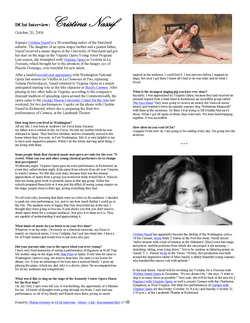 |
|
|
"Role of Carmen is tricky but a treat" - Interview by Clarke Bustard, Special Correspondent - Richmond Times Dispatch
(Photo: Gallery Studios, courtesy of Opera Tampa)
|
|
|
|
Carmen, the Spanish gypsy whose tempestuous, fatal love affair is the subject of Georges Bizet's opera, is one of the dream roles for a singing actress.
It's also one of the trickiest, says Cristina Nassif, the soprano starring in Virginia Opera's production of "Carmen."
Unusually for a female character in a 19th-century opera, Carmen is not subservient to or dependent on men. As she carries on a torrid love affair with the young Spanish soldier Don Josť, she revels in her sexuality but guards her independence.
"That's what shocked people about this story in the 19th century," Nassif said last weekend. "It's very exciting, very liberating to play such a 'modern' woman."
Dramatically, though, portraying Carmen means walking a fine line between sensuality and sluttiness. "I'm going for a more subtle approach," Nassif said. "You don't need to try too hard" to convey the character's potent sensuality. "Her passion and her passion for freedom are sexy in themselves."
Nassif, who starred as Violetta in Virginia Opera's production of Verdi's "La Traviata" last season, is joined in "Carmen" by two newcomers to the company: tenor Bryan Register as Don Josť and soprano Catherine Cangiano as Micaela, the young woman left behind by Don Josť as he pursues Carmen.
The production, conducted by Peter Mark, ends its run with two performances in Richmond next weekend.
Nassif, who recently sang "Carmen" at Opera Tampa in Florida, "learned a lot about myself, vocally and physically, in this role. Any performer will learn so much about her strengths just trying this character on for size.
"Many great singers and actresses have inhabited this role, and each one gives Carmen a different character and color."
Virginia Opera's "Carmen," directed by Dorothy Danner, "is quite different from the one I did in Tampa," Nassif said by phone from Norfolk.
The singer believes her ethnic background gives her special insight. Her mother -- and first voice teacher -- is Spanish; her father is Lebanese. "That pretty much covers the Mediterranean, whose culture is reflected vividly in this drama," Nassif said.
"Growing up and studying with my mother exposed me very early to the whole concept of Spanish flair -- the way Spanish women carry themselves and assert their strengths."
Nassif's portrayal of Carmen "goes in directions that may surprise people, while remaining in the tradition" surrounding Bizet's opera, she said. "We're aiming for a real Carmen, a character who's not a clichť and who shows people something new."
|
|
|
"A woman of high note: Cristina Nassif as Carmen" - Interview by April Phillips, Correspondent - The Virginian Pilot
(Photo: Walter Carter)
|
|
|
|
Some people believe that opera divas are simply born, not made - that they are wailing high E notes before they're eating solid foods.
In many ways, this myth has added to the mystery and allure of the art form. However, audiences who attend Virginia Opera's sexy season opener of "Carmen" will see first hand how important training and encouragement can be for young singers.
Cristina Nassif is the 29-year-old soprano portraying the sultry gypsy who seduces an innocent corporal named Don Jose in the production that opens Friday. With her big, black eyes and lustrous long locks, she looks like Carmen incarnate. Yet this Maryland native is far from a born diva. In fact, she credits Virginia Opera's artistic director, Peter Mark, and the company's Spectrum Resident Artists Program for believing in her talent when no one else did.
"Virginia Opera gave me that first chance," Nassif said. She participated in the program, often referred to as Young Artists, in 2004. Virginia Opera has been developing young singers for more than 30 years, but the formal program, with extensive contracts and residency requirements, began in the mid-1990s. Participating singers, most of them between 25 and 30, are paid a stipend and given the opportunity to work on main-stage operas in small roles and as understudies for the leads. They also hone their skills through professional workshops, training classes and daily performances in area schools.
This year they are combining kid-friendly characters from such stories as "Alice in Wonderland" and "Little Red Riding Hood" with characters from upcoming operatic productions to teach children the basics of opera.
Many of these performances occur early in the morning, when opera singers are typically reluctant to sing because they're afraid that without extensive warm-ups, they won't be able to hit high notes. Nassif said the regimen was tough but rewarding.
"It helped me with early morning auditions. I learned that I really can sing at 9 a.m. Plus, I learned that I can take risks, and I will take those risks when I sing at the Met one day, God willing. I learned that here, and I always feel like I'm coming home when I'm here."
It's not a homecoming just for Nassif. Seven current or former members of the Young Artists program are in "Carmen." Eric Greene, who portrays the larger-than-life bullfighter Escamillo, is also a Young Artists alum. In the fall of 2000, the Juilliard graduate auditioned for a role in Virginia Opera's "Porgy and Bess." He didn't get the part, but he did get an offer for the Spectrum Resident Artists Program, which he readily accepted. During this time, he was an understudy for the role of Escamillo. He feels his return to Virginia Opera has brought him full circle.
"When I covered the part, I said, 'I'm going to sing this role someday.' Now it's like coming back home and Daddy acknowledges that you're all grown up," he said of Mark's offering him a lead part in "Carmen." Now that he is in the spotlight, Greene said he hopes to be a role model for the young singers who are now understudies with Virginia Opera.
"I want the people who cover me to know that I respect them. It's important to remember where you come from."
Mark said the auditioning team typically hears 500 or more singers a year, and this season they brought six into the program.
"As long as we identify the right talent, they will shine," Mark said. "We identify major up-and-coming singers and complete their training while giving them professional performing experience. The Young Artists program allows us to take gifted artists and help them with the vital transition between being opera students and opera professionals."
For Nassif, that transition occurred very quickly. Assistant Artistic Director and Associate Conductor Joe Walsh believed she was ready to tackle Violetta in last season's production of "La Traviata." It's known to be a difficult role, but Walsh persuaded Mark to give her an audition.
One listen, and Mark believed she had it in her. At first, Nassif wasn't so sure.
"When they gave me the role, it was a dream. Great singers have filled that role. I was scared, but Peter believed in me. Opening night I was on the phone with my mom, and she said, 'We all believe in you, but now you have to believe in yourself.'"
Nassif embraced the part, and an impressed Mark made some phone calls. When the performance moved to Fairfax, Nassif came to the attention of famed tenor Placido Domingo. She auditioned for him - and that led to her Washington National Opera debut in May.
With success stories like these, Mark feels the Young Artists program is a win-win situation for local audiences and the opera world.
"As exciting as this is for our performances here, we're performing an incredible service for the field of opera. Nothing is more thrilling than giving a person the tools to develop. Watching an artist develop their own potential is exciting, and it's always more fun to see a person on the way up than on the way down."
Cristina Nassif will return to Virginia Opera to close out the season as Nedda in "I Pagliacci."
|
|
|
"A gypsy and a toreador " - Interview by David Nicholson - Hampton Roads Daily Press
(Photo: Anne M. Peterson)
|
|
|
|
Carmens don't burst onto the opera stage overnight. Building an opera career takes years of study followed by another long period singing minor roles and slaving in company apprentice programs.
Cristina Nassif and Eric Greene, playing Carmen and Escamillo in Virginia Opera's 'Carmen' opening Friday, wouldn't have it any other way. The soprano and baritone are returning to a company they started with as Spectrum Artists, the organization's apprentice program.
Most companies run apprentice programs, sometimes referred to as 'opera boot camp,' that can last nine months or more. In exchange for touring in school productions for the company's educational program and playing small roles on the main stage, young singers gain valuable experience working with major conductors and stage directors.
Landing a spot in one of these programs can be just as competitive as applying to a prestigious music school. Virginia Opera had more than 350 applicants for six positions this season, says Joe Walsh, the opera's assistant artistic director.
Nassif and Greene really got their feet wet with Virginia Opera's touring program, one of the most extensive in the country. During separate years, they criss-crossed the state, from Tidewater to Northern Virginia and out to Wise County near the West Virginia border, performing in the 'Oh Freedom!' school program.
'You come out stronger and better and ready to face the big bad world of opera,' says Greene, who studied at Juilliard School of Music before becoming a Spectrum Artist in 2000 and 2001.
'This program has afforded me work with larger companies,' he says. 'Conductors and directors at other companies appreciate it. They notice the good training I've gotten.'
While music schools massage the voice, says Nassif, a 2004 apprentice, they don't always give students extensive training in dramatic stage presence.
And young singers rarely get that training when they land a small role with a major company. Walsh feels Virginia Opera's medium size makes it the perfect venue for training young singers.
'It's a multi-faceted program in which they get nine months of vocal teaching, acting training and work ethics, such as how to prepare for a role,' he says. 'We coach them in roles of their choosing, and they get to work with the top members of our staff. They also get to watch more accomplished artists.'
There are other benefits as well. Walsh and Artistic Director Peter Mark follow these artists' careers and help them find other jobs in the business. They let them sit in on singer auditions held each December in New York and recommend them to agents when they are ready. Greene met his agent, Bernard Uzan, during a Virginia Opera production; Nassif signed on with agent John Miller after Walsh recommended her.
Mark first saw Nassif in a Maryland vocal competition when she was 18. He steered her to the Spectrum Artists program and eventually cast her as Violetta in 'La Traviata' and in this month's 'Carmen.' Walsh saw Greene in a recent opera production in Detroit and recommended him for Escamillo.
'Eric has an extraordinary instrument with a range that few baritones have,' says Mark. 'When he first auditioned for us, he was not together. Now he's turned into such a refined artist.'
Their training has led to these major roles in 'Carmen,' Bizet's popular opera. Nassif plays the sultry cigarette factory worker who seduces Don Jose, only to throw him over for the handsome toreador, Escamillo.
'The people that have been through the program are better prepared and understand all musical and vocal issues,' says Mark. 'We have given a lot of artists a really solid grounding. What they get in Virginia Opera is a really dedicated family of professionals.'
|
|
|
Cristina's World - Port Folio Weekly's Fall Arts Preview
By Leona Baker - September 12, 2006
(Cover and inset photo: Kathy Keeney. Traviata Production Photo: Anne M. Peterson)
|
|
|
|
|
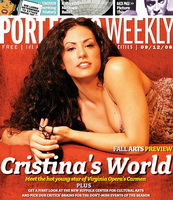 |
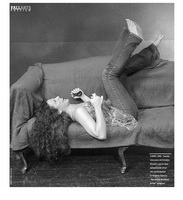 |
|
Cover |
Inset |
|
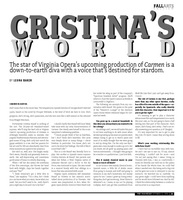 |
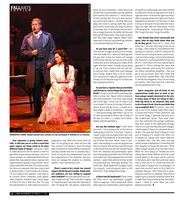 |
|
Article, pg 1 |
Article,†pg 2 |
|
|
|
|
Spotlight on Cristina Nassif with Stephen Baker, VA Opera
(Photo: Joe Bowman)
|
|
|
|
In the autumn of 2005 Ms. Nassif took some time to answer the following questions, giving Virginia Opera audience members the opportunity to see another side of the woman theyíd soon witness stepping into the shoes of one of operaís most demanding characters Ė Violetta Valery in Verdiís ďLa TraviataĒ Ė for the first time.
Why opera?
Opera affects me unlike any other art form. Bringing drama to life through music allows me to explore a boundless variety of emotions. Not only am I breathing new life into characters defined and redefined, but I learn a great deal about myself in the process. I get to be both vulnerable and strong: an incredibly liberating combination. With so many heroines that interest me, I canít imagine being in any other profession right now!
How do you approach a character?
As naturally as possible. By following my instincts, many come very naturally to me. I try to bring a bit of me into any character by searching myself for emotions both alive and dormant. Iíve had the luxury of portraying plenty who have at least one or two of my own personality traits. When faced with the more difficult task of portraying a character to which I cannot relate, Iíll delve into why I canít and go from there.
Are you able to relate to Violetta? How?
Beneath the material excesses of Violetta Valery there lies an extraordinarily passionate spirit, a childlike vulnerability, an enormous heart, and a capacity to love which ultimately gives her the strength to sacrifice her one chance of happiness Ė life itself in the process Ė for the man she loves. I believe that anyone whoís truly loved or has been faced with walking away from true love can relate to this woman.
When youíre not involved in a production, what are you likely to be doing?
Most likely preparing for or involved in another project. If not, Iím brushing up on repertoire for auditions and continuing to work on my overall package. I wonít pretend I donít welcome breaks, but I am a bit of workaholic Ė I suppose one ought to be in this line of work Ė and I find that after a few days away from it, all I want to do is get back to it.
If you werenít an opera singer, what profession would you choose, and why?
I envisioned myself as a teacher since I am crazy about children. Not only do their faces light up when you introduce them to something new, but they canít hide their excitement when you remember to come back to the familiar things they love. This may sound elementary but I think itís the same thing with a performer and an audience. Letís face it, an audience embraces being awakened by some new emotion while welcoming those simple pleasures that opera affords.
In the future, what is the one thing you would most like to accomplish?
I sincerely hope to fall in love, get married, and start a family. As an artist, I know how much life and love affect the way one approaches a character and music. I know Iíll find new and greater inspiration when Iíve found the right man and have children of my own to share the experiences of being a performer.
Who has had the biggest influence in your life, with regard to where you are now?
My parents. Both musicians, I found my music in them. My mom was my first teacher and will always be a positive influence for me. Theyíve never doubted for a moment that I would make it here and itís their constancy that has paved the road Iím going to continue to follow.
What are your best memories from your time as a young artist with Virginia Opera?
Besides the obvious: performance and coaching opportunities with the company and its extended audience, I have to say the antics of traveling all over the state of Virginia with two of the sweetest men to grace this earth (my ďOh FreedomĒ tour partners). I trust weíll always be a part of each otherís lives. The whole company treated me like family, another beautiful memory I will take with me always.
What is the strangest thing youíve ever experienced or witnessed during a performance?
A friend, playing one of the ladies in waiting in the banquet scene of Lucrezia Borgia where not much movement was required of her, injured her foot a few days into the performances. Fitted into an orthopedic boot she still managed to get herself into costume and on stage. One unfortunate night, in the midst of this merry drinking scene, the skirt of her costume gave way! She didnít realize until it was around her knees. Imagine hobbling around the stage in a boot under a heavy costume and now add to this the embarrassment of dropping your skirt and trying to gracefully exit the stage. The other ladies had full skirts and swiftly gathered round her in ďgossipĒ fashion and, as providence would have it, just in time to flee the scene of a quarrel between Gubetta and Orsini.
Tell us something about yourself that would surprise most people.
Would you believe that in some situations I can be unusually shy? In case that doesnít satisfy you, Iíve also been plagued by a knack for breaking things. Never fails. If something is about to break, Iíll be the one to touch it right before it does. If something seems impossible to break, Iíll be the one to break it.
If you could sing any role in the world, which would you choose? Why?
I am about to sing it (Violetta) and, if you come to see the production, youíll understand why!
If you could change one thing about the world of opera, what would it be?
I hope to encounter an opera world that embraces individuality and charisma in singers the way Virginia Opera does.
Some people see you as a quickly rising opera star; how do you see yourself?
First of all, I want to meet these people. Iíd love to see myself through their eyes! I feel blessed to be where I am right now, working with such inspiring and encouraging professionals. I donít want to rush anything and simply have to believe that each new experience will yield another.
|
|
|